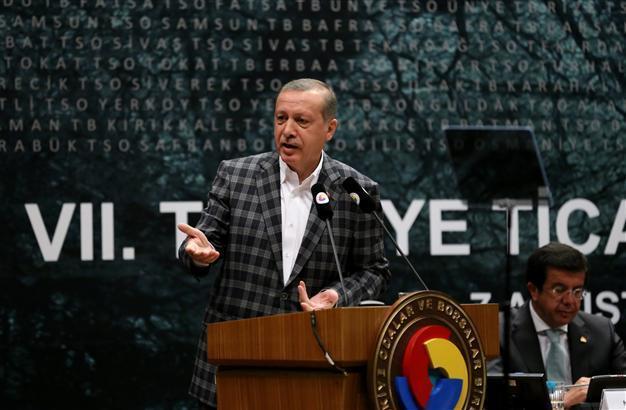I’m tough, will be tougher, says PM Erdoğan
ANKARA

PM Erdoğan speaks during the seventh Turkey Commerce and Industry Council. AA Photo
Acknowledging that his approach toward the so-called “parallel structure” has been unyielding, Turkey’s presidential hopeful Prime Minister Recep Tayyip Erdoğan has promised that he will be even more aggressive against the entity, accusing it of “espionage and treason.”“There is an obvious and flagrant treason. Today, if there are still people who keep silent vis-à-vis this flagrant treason, I’m telling them very openly to review their position. ‘Tayyip Erdoğan is very tough.’ Yes, I’m very tough in these cases. If there are people who are uneasy with this, I will continue being tough because I’m tough since the high interests of my nation and my country require this,” Erdoğan said in a speech at the seventh Turkey Commerce and Industry Council.
Speaking only days after dozens of Turkish police officers were detained in a widening probe into wiretapping allegedly targeting him, Erdoğan said Aug. 7 that his telephone conversations with foreign statesmen had been recorded and then leaked.
“Without any embarrassment, they are talking about patriotism in this country. What kind of patriotism is this?” Erdoğan said.
“Isn’t this eavesdropping espionage activity?” he asked, as he noted that even encrypted telephone conversations between him and members of his Cabinet were wiretapped. “What will they do with my conversations with Mr. [Palestinian President Mahmoud Abbas] and the president of Somalia? Why are they using these and to whom they are leaking them?” he asked at the meeting hosted by the Union of Chambers and Commodity Exchanges (TOBB).
In an unveiled message delivered at a meeting of an organization which represents a network of over 1.4 million enterprises, Erdoğan, thus, called on all to take their side in the fight between him and his erstwhile ally, U.S.-based Islamic preacher Fethullah Gülen, following the huge graft scandal that shook the government after breaking at the end of 2013.
The term “parallel state” or “parallel structure” is commonly used by critics to refer to the Gülen movement. Gülen has been in voluntary exile in the United States for over a decade. Erdoğan alleges that the “parallel state” orchestrated the Dec. 17 and Dec. 25, 2013, corruption investigations – which ensnared the sons of three former ministers and businesspeople known to be close to the government – in order to unseat him and his government. The ruling Justice and Development Party (AKP) has responded with a series of huge counteraction purges and replacements, particularly in the judiciary and the police, where Gülen’s followers are believed to be prominent.
“The fight against the parallel structure is not a fight of mine or my party; it is Turkey’s fight and is a matter of national security,” Erdoğan said, likening it to the “War of Independence,” in an apparent reference to the War of Independence that led to the foundation of the Republic of Turkey in the early 20th century.
“I underline once more; because the parallel structure’s target is not me, our party or our government. The parallel structure’s target is the Republic of Turkey and is directly the national will,” he said.
PM points finger at prosecutor Öz, HSYK
Erdoğan, meanwhile, also personally joined the public bashing of senior prosecutor Zekeriya Öz, suggesting that the latter had acted “disrespectfully” and “immorally” to himself, while also attacking the country’s top judicial body due to the lack of any disciplinary action against Öz.
“If a prosecutor is coming up and disrespecting the prime minister, a minister, by acting beyond manners and modesty and state ethics; then it means that the judiciary has begun raising doubts about itself,” Erdoğan said.
Erdoğan’s outrage came after Öz filed a criminal complaint against both Erdoğan and Interior Minister Efkan Ala over an ongoing investigation against the police officers who carried out the corruption probe engulfing Erdoğan and his ministers.
“The judiciary speaks with its rulings. The judiciary is not an institution assigned with responding to politics. Can you imagine now that this country’s HSYK [the Supreme Council of Judges and Prosecutors] is still not taking the required step about this person who violated his duty of prosecution? Why? Here, this is the mentality called the ‘parallel structure,’ and this mentality can very openly protect [itself],” Erdoğan said.
Öz is a former Istanbul deputy chief prosecutor who supervised prosecutors in the Dec. 17 investigation into corruption claims. He was also the lead prosecutor at the beginning of the controversial Ergenekon coup plot case.
As part of the purges against Gülenists, Öz was assigned to the Bolu Prosecutor’s Office in February, shortly after being assigned to Istanbul’s Bakırköy district.
Öz is alleged to have installed a special camera system in his office in the Istanbul Courthouse, with which he is accused of secretly recording meetings.
In early June, Justice Minister Bekir Bozdağ took the initiative to launch an investigation into Öz and three judges who issued court orders for the arrest and freezing of assets of graft probe suspects in the Dec. 17 and Dec. 25 investigations. Bozdağ therefore overruled the country’s top judicial body, which had dismissed the need for such an investigation. The justice minister has the legal authority to overrule such decisions by the HSYK.
Recently, while filing complaints against Erdoğan and Ala, Öz criticized the government for intimidating members of the judiciary through baseless statements and media stories even though procedures for investigating members of the justice branch are clear.
Ala responded to Öz’s criticisms immediately after the issuance of the criminal complaints, saying: “Those who think they can rule the country as a gang will pay the price for it. Everybody will do their own job.”
















